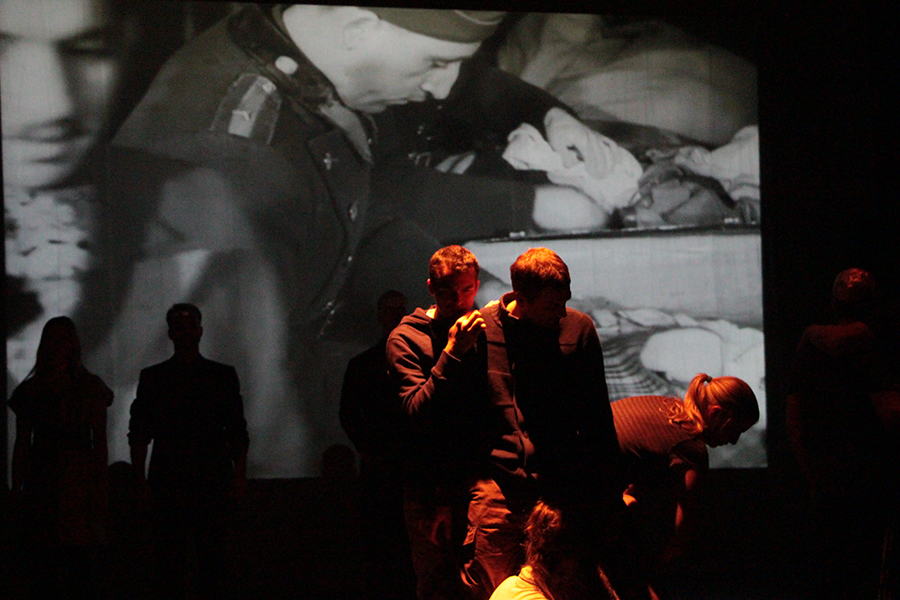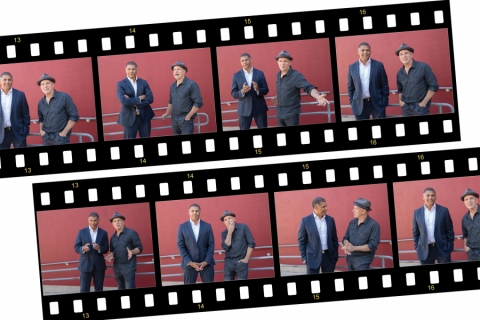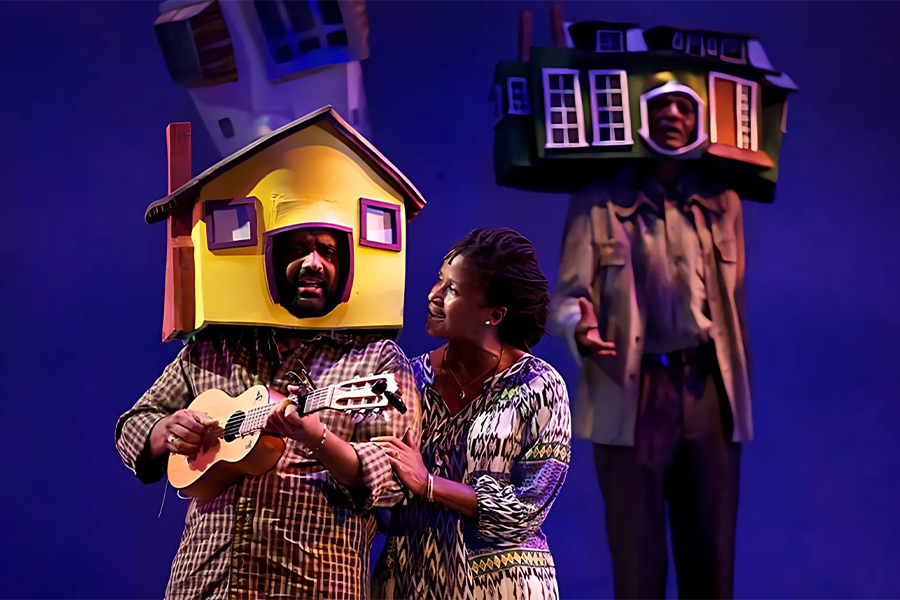Dramatic Action
Theater of Community festival challenges bigotry, bias and ideas of identity
By Christine Byrd
Can theater help us navigatethe real-life dramas created by bigotry, bias and our own sense of identity? The creators of Theater of Community believe it can.
Running through the spring of 2025, the theater festival delves head-first into hot-button issues of anti-Blackness, Islamophobia and antisemitism through plays, workshops, film screenings, one-Can theater help us navigate person shows and more. Developed by the Department of Drama faculty Bryan Reynolds and Zachary Price, Theater of Community is funded by the UCI Office of Inclusive Excellence Confronting Extremism Award.
“Theater of Community is about bringing various voices together so that they can have a conversation — not to come to a nice, tidy, easy answer,” said Price, associate professor. “But to ask questions which lead to more questions.”
The entire festival is free and open to the public, with the goal of fostering healthy ongoing dialogue about difficult topics among students and the community at large. But, Price and Reynolds warn, the performances they selected will make audiences uncomfortable, forcing them to examine their own biases and how they define their own identities. Ultimately, they hope that grappling with those complexities leads to deeper understanding, knowledge and compassion. As an avid participant in theater festivals around the world, Reynolds points out that other developed nations prioritize funding for the arts as essential to fostering a thoughtful, engaged citizenry, while in the U.S., that responsibility tends to fall to universities.
“Art fosters dialogue and creates a public forum for free speech in a way that, on the one hand, softens the blow, making the speech more indeterminate and more negotiable,” said Reynolds, Distinguished Professor and Claire Trevor Professor. “Encouraging people to be more creative in how they address challenging issues works to develop a smarter and more compassionate society overall.”
Pushing Boundaries
The festival kicked off in November 2024 with Ghost Town, a play about Venice, California’s once-thriving beachfront Black community that was pushed out by gentrification. A public conversation between playwright Juliette Carrillo, associate professor, and Nataki Garrett, artist and arts executive, allowed for deeper exploration of the historical context and its lasting legacy.
Image: From the original 2016 production of Ghost Town, written by Juliette Carrillo. Photo: Kevin Michael Campbell.
Additionally, Community of Theater will support student-led affinity groups, including Black Door Theatre Company’s production of Fairview, the Pulitzer Prize-winning play by Jackie Sibblies Drury, Dec. 6 to 8, 2024. The play starts as a comedy, but as White actors start replacing Black characters, morphs into a thought-provoking exploration of race, identity, and the role of the audience.
Continuing the festival in February 2025, spoken-word artist Saul Williams — also an author, actor and director — will perform and give a talk about the intersection of art and politics.
Later in the month, Shamell Bell, a choreographer, producer and activist who helped organize Black Lives Matter Los Angeles, will offer a workshop, performance and conversation.
Then Benjamin Rivers will perform a one-person show and offer a workshop about Playback Theatre, an interactive theater model he uses in conflict zones around the world. After hearing stories from the community, professional actors “play back” their account on stage. Later in February, the festival will feature a screening of Michael Dahan’s Yes Repeat No, about Juliano Mer-Khamis, a Jewish Palestinian who co-founded a community theater for young people at the Jenin refugee camp in the West Bank. The biopic asks “whether it is remembering our past — or, instead, forgetting it — that allows us to break cycles of identity and conflict,” according to its creator.
"In order for theater to its work, it must both entertain and educate — it needs to push boundaries."
The festival continues through winter and into spring with a production of Poland is Not Yet Lost!, which imagines the country — where hundreds of thousands of Jews were murdered in pogroms decades before World War II began — as the future state of Israel.
Reynolds and Price intend for all of this experimental and provocative work to spur UCI students’ creativity.
“Ideally the university is a laboratory in which students can perform different aesthetics with academic and artistic freedom," said Reynolds. "In order for theater to do its work, it must both entertain and educate — it needs to push boundaries. Hopefully the different theatrical styles and programs will make the engagement more complex and create a more profound impact, while also encouraging our students to take more risks artistically.”
Challenging Identities
From Feb. 21 to March 1, 2025, Reynolds and Price will both stage productions of their own plays that tell stories spanning several generations and raise questions about how identity is defined by religion, race, society and history.
“In this project, in my classroom, in my own practice and research, I approach theater as a method of inquiry that includes performance, behavior, language and knowledge production,” explained Price.
Price’s play Ancestry, still in its workshop phase, features characters pop culture enthusiasts will recognize — who attempt to negotiate the complicated relationships between the afterlives of slavery, the university and the Hollywood apparatus. The play will be directed by Daniel Keeling, assistant professor of teaching.
"Our social identities are something that performed..."
Then Reynolds’ Railroad tells the story of the Mayers, a German Jewish family forced onto a Holocaust train for relocation and the German Nazi Reinhard family, who steal the Mayers’ passports and attempt to escape ultimately to the United States passing as Jews. The play has been adapted around the world since it first premiered at UC Irvine in 2006, and this production will be directed by Chloe King, M.F.A. '22.
By forcing audiences to question the very foundations on which they define social identities, these productions invite us to “confront the duplicity in our everyday lives,” explained Reynolds. “Our social identities are something that are performed; their value comes in not just what we think but what we do. The works we’ve chosen in the festival all expose the irony, the contradictions, the hypocrisy — but also the possibility to be multiply present and not just lost in conflicting realities.”
Loosening our own grip on a specific social identity we’ve embraced, Reynolds pointed out, can help each of us become more compassionate toward one another.
Continuing Conversations

Image: Railroad, written by Bryan Reynolds. Photo: Courtesy of Transversal Theater Company.
The creators aim to ensure the end of the festival is just the beginning of a dialogue for the community and for UCI artists. Reynolds explained the goal of “eventualization” — the idea that audience members keep thinking or talking about a show for hours or weeks after the performance. In drawing on history including American slavery and the Holocaust, the festival “eventualizes the history of bigotry and racism” for ongoing conversation.
“We hope the festival becomes a nexus for exchange among artists and cultural workers from around the world,” said Price. “Maybe they will collaborate together on a future project that feeds back into the art and the conversation.”
Reynolds and Price envision papers, edited volumes and artistic collaborations between students and international artists being among the festival’s long-term outcomes. Especially for the students staging performances that explore some of the darkest sides of human history, there is a focus on how they will navigate that from the perspective of their own identities. Whether drama students aspire to go into boundary-pushing theater or commercially popular productions, participating in the festival will enhance their preparation.
“Actors can be endowed with a skillset that's more than just playing a role well,” said Price. “We at UC Irvine can train a legion of actors who go out into the world and keep people socially engaged in a critical way.”
For a complete list of Theater of Community events and to register, visit sites.google.com/uci.edu/theaterofcommunity.
Please visit our secure direct giving page and make a gift to support CTSA today!


